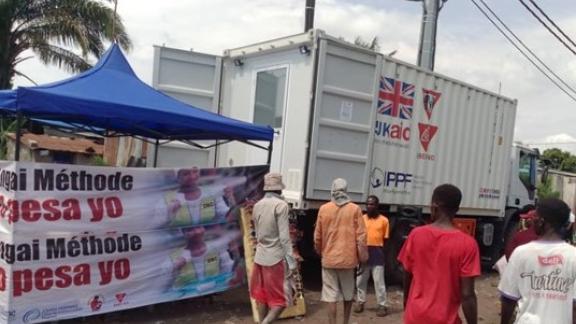The Democratic Republic of Congo (DRC) is Africa’s second-largest country with 94 million inhabitants, and the sexual and reproductive health (SRH) challenges are correspondingly immense. The country is still, in a fragile phase of post-conflict reconstruction, has very high maternal and new-born mortality rates (30 per 1000 live birth), [1] and HIV prevalence [2](0.7%) as well as a legacy of sexual violence, propagated during conflict times. The unmet need for family planning stands at 21%[3], while facing a wide gender disparity in secondary school education with teenage pregnancy, early marriages, and social norms being key causes.[4]
Atusiko Pika Belle, now aged 22, previously dropped out of secondary school when she became pregnant, to take care of her child. “I was chased out of the house by my father because of this. Some of our family members intervened and he allowed me to come back home,” she said. She is a single mother living in Kinshasa.
A Step Forward
Atusiko, queues up with other women outside a WISH mobile clinic in Nsele, a municipality in Kinshasa. She heard about it from a community health volunteer and is interested in getting a contraceptive method, since many women and girls from the area are unable to access and afford contraceptives. Unfortunately, the DRC health system faces many challenges including low coverage and availability of clinical and community family planning services.
“I came as soon as I could. The contraception will prevent me from getting pregnant. I can focus on taking care of my child and go back to finish my secondary studies without another interruption.”
The WISH Lot 1 programme is led by MSI Reproductive Choices and implemented in DRC through a partnership with IPPF through its Member Association, Association pour le Bien-Être Familial – Naissances Désirables (ABEF-ND). Under the ‘Leave No One Behind’ strategy, the programme focuses on providing integrated sexual and reproductive services to marginalised communities such as youth under 20, people with disabilities, people living in poverty, and those in humanitarian settings.
Under the WISH project, ABEF-ND developed a strong network of community-based distributors and community-based services, but this system has its limits as only a limited range of contraceptive methods and services can be provided. To fill this gap and expand its reach, ABEF-ND, through WISH operates a mobile clinic. ABEF-ND can now reach underserved people within their communities, reducing the barrier of transport time and costs to reach services. Integrated services are provided at the mobile clinic including blood tests, cervical cancer screening, and gynaecologyy consultation.
A Brighter Future
“No one ever spoke to me about sex or provided me with this information when I was growing up. Maybe my life would have been different,” said Atusiko. She had a counselling session and opted to receive an implant.
She can now plan her future. “I have been worried about getting pregnant again. I want to finally go back to secondary school. My dream was to study economics at university, but it might be difficult due to finances. I’m now thinking about studying hospitality and working in the hotel business”.
In a day the mobile clinic can serve more than 100 clients. Follow-up care is an essential consideration for the programme. “We organise outreach activities in collaboration with the Ministry of Health and the Health District, who provide their own staff ensuring follow-up care for our clients after the mobile team leaves the community,” said Eugène Byianga, the WISH Monitoring and Evaluation Advisor at ABEF-ND.
The WISH ABEF-ND team shall continue to deploy the mobile clinic in Kinshasa and is planning to move to other regions such as Kwilu in the next months.
Atusiko’s story is representative of one of the many challenges faced by women and girls in DRC. The story underpins the inter-relationship of key issues such as SRH and education. Collaboration by all key stakeholders including programmes like WISH, Government, and other development partners is essential in empowering them to take charge of their sexual and reproductive lives and fulfil their dreams.
[1] United Nations Inter-agency Group for Child Mortality Estimation (UNICEF, WHO, United Nations Population
Division and the World Bank).
when
country
Congo, Dem. Rep.
region
Africa









